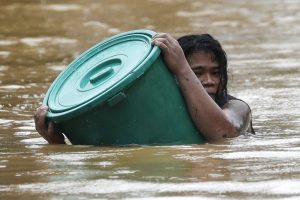A typhoon swelled rivers and flooded low-lying areas as it passed over the storm-battered northeastern Philippines, leaving at least 13 people dead and 15 others missing, officials said Thursday.
The Philippine National Police reported the casualty figures, but gave no details.
Typhoon Vamco passed north of Manila between Bulacan and Pampanga provinces, toppling trees and knocking out power. Officials said earlier that nearly 200,000 people had been evacuated, some forcibly, from vulnerable coastal and low-lying areas.
Officials said about 1.9 million households were without power in Metro Manila and nearby provinces. Many electricity poles were toppled, power lines were knocked down and power transformers were damaged.
President Rodrigo Duterte took a break from an online summit of Southeast Asian leaders to fly by helicopter over the affected areas.
“As president I guarantee you that your government will do its best to provide assistance in the form of shelters, relief goods, financial aid and post-disaster counseling. Rest assured, the government will not leave anybody behind. We will get through this crisis,” Duterte said in a televised address.
Rescue teams were deployed to flooded areas in Rizal province, coast guard chief Adm. George Ursabia told DZBB radio.
Marikina city Mayor Marcie Teodoro said fierce winds knocked down power lines overnight, leaving many areas without power and internet service. Heavy rains also flooded many areas and the Marikina River was swollen. Many people in Marikina city were waiting to be rescued from roofs.
“There are many areas that historically don’t get flooded but now they are swamped, like city hall,” he told DZBB radio.
Mark Timbal, spokesman for the government’s disaster response agency, said 363 rescue teams had been deployed consisting of 1,000 rescuers with at least 40 rubber boats.
The typhoon had maximum sustained winds of 130 kilometers per hour with stronger gusts Thursday morning. It was moving west-northwest at 30 kilometers per hour and was headed for the South China Sea.
The government’s main disaster-response agency had pleaded to the media to relay typhoon alerts in northeastern areas devastated by an earlier typhoon, Goni, saying the agency’s messages could not be sent by cellphones due to damaged telecommunications systems.
Goni, one of the strongest typhoons in the world this year, left more than 30 people dead or missing and damaged or destroyed more than 270,000 houses, many in coastal villages. Tens of thousands of people remain displaced.
The Philippines is hit by about 20 typhoons and tropical storms each year. It is located on the Pacific “Ring of Fire,” where earthquakes and volcanic eruptions are common, making it one of the world’s most disaster-prone countries.
By Jim Gomez for the Associated Press in Manila, Philippines. Associated Press journalists Aaron Favila and Joeal Calupitan contributed to this report.

































